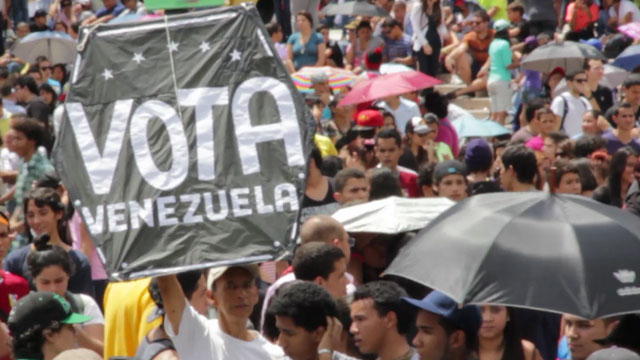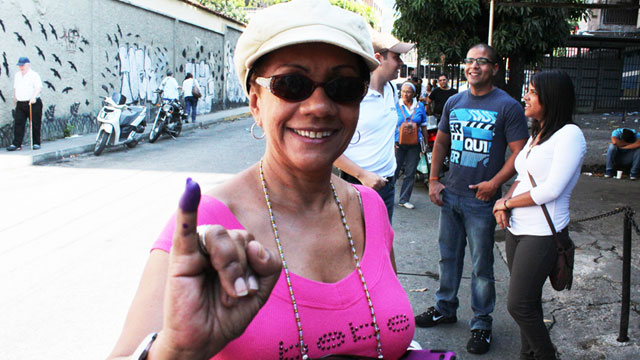Venezuela Presidential Election 2012: Everything You Need To Know in One Post

Venezuela is holding presidential elections on Sunday, October 7. Latin American leaders, oil investors and international news junkies might find themselves glued to computer screens and TV sets, rooting for President Hugo Chávez or perhaps hoping that he fails to hold on to another six-year term if opposition leader Henrique Capriles wins.
We are following the elections in Venezuela closely and will be posting updates here frequently.
A look at our coverage thus far is below and be sure to follow our correspondent Manuel Rueda who is in Caracas, on Twitter, as well as our Twitter account @UnivisionNews.
10:30pm Hugo Chávez declared winner
President Hugo Chávez has retained power in Venezuela, after defeating opponent Henrique Capriles, by a comfortable victory of 900,000 votes.
Chávez, the longest serving president in Latin America, has been re-elected for the third time. In the months leading up to the election Capriles had been widely portrayed by the international press as his toughest opponent thus far, with some polls saying that Capriles could win the vote.
In Sunday's election however, Chávez got 54.42 percent of the vote, while Capriles secured 44.97 percent. The victory margin for Chávez was smaller than what he had attained in previous elections, in which he had defeated his opponents by 15 points or more.Read full story here.
8 p.m. -- Venezuelans geting a tan from waiting in line for hours
"ELECTORAL TAN!!! I've been in line for six hours, but there will be no 'tortoise operation' that can stop me," wrote Twitter user Eliana Lopez Alvarez, a journalist who ended up waiting eight hours under the sun.
For more on the long election day in Venezuela read full story here.
7 p.m. -- Videos: Dancing their way to election day
Venezuelans had their spirits high throughout the day. Whenever possible they would break out singing or dancing. The video below, taken in New Orleans by Primer Impacto producer Silvia Salgado, shows Venezuelans dancing to merengue by Juan Luis Guerra while they waited to board buses after voting. To see more videos of Venezuelans dancing on election day, check out our Tumblr.
6:30pm -- Reactions on Twitter
Así votaron en la Embajada de Venezuela en Paris, Francia. twitter.com/AnaisDsantos/s…
— I'm Parawhore.(@AnaisDsantos) October 7, 2012
Twitter has been flooded with images and messages of hope from Venezuela and around the world. We've curated some of the best tweets for you here.
6 pm -- Voting centers closing at 6pm local time
Those voting centers that no longer have any people waiting to vote are closing in Venezuela. After a day of long lines, broken-down machines and crazy rumors, citizens are going home to wait for the results.
But there are still some centers with hundreds of voters waiting for the National Electoral Council (CNE) to approve manual voting due to faulty machines. This manual system could add hours to the voting counting process.
Venezuelan TV station Globovision reports that in many centers waiting for a new machine has also been an ultra-long process. In Aula Nueva in Santa Paula, one of the larger voting centers, people were waiting for a new machine to arrive since 12 p.m. They finally received it at 6 pm. In the Colegio Cervantes, another voting center on the Avenida Andrés Bello, there have been many reports of voting machines breaking down. Table 6's machine was changed six times before it worked properly.
Venezuelan media is monitoring Tibisay Lucena, the president of the CNE, as she heads into the tallying room. Lucena will be the one to announce the results, but it is unclear exactly when this will happen. If Venezuela's history is any indication it could be as late as 3:30 am ET. -- Ana Maria Benedetti
4:15pm -- Venezuelans vote in Mexico City
Outside of the Venezuelan embassy in Mexico City, hundreds of people lined up to vote...and danced and cheered and chanted "There is a way!" In interviews, voters were heavily in favor of Henrique Capriles, Hugo Chávez's rival in the presidential election. Many said it was the biggest turnout they have seen at the embassy for any Venezuelan election.
Approximately 100,000 Venezuelan voters are registered to vote overseas, in 80 different countries. While most voters in the Mexico City crowd were supporting Henrique Capriles, it's hard to tell if their votes will have much of an impact: Venezuela has a total of about 18.9 million registered voters.
But this afternoon, the Mexico City crowd was optimistic and enthusiastic. Voters and supporters blocked the street in front of the embassy dancing to drum beats and waving Venezuelan flags. Many voters said they believe that this time, after 14 years with Chávez; Venezuela was ready to make a change.-- Diana Oliva Cave
3:20pm -- Capriles votes
Opposition candidate Henrique Capriles just voted in Las Mercedes, a middle class neighborhood in Caracas. Capriles said that he would respect the election results, adding that "the will of the people," was "sacred" to him.
Despite concerns from some sectors of the opposition that the government might commit fraud during these elections, Capriles said that he fully trusted Venezuela's electoral institutions.
"If I didn't have full trust in the [Venezuelan] electoral process, I wouldn't be here," Capriles said.
Capriles also said that after the election result is announced tonight, residents of the deeply polarized country should make an effort to put their political differences aside. "Venezuela, will be one country tomorrow," Capriles said. "There will not be a defeated people here."
Journalists from several South American countries attempted to get Capriles to speak about what his foreign policy would look like if he wins the election, with one reporter from Ecuador asking Capriles if he would be "as generous" with that country as President Chávez has been.
Capriles refused to answer these questions. "Let's not get ahead of the results," the 40-year-old opposition candidate said. The state-run television network Venezolana de Television did not show the Capriles press conference, even though it had previously broadcast the Chávez post-vote press conference in its entirety. -- Manuel Rueda
2:25pm -- Chávez Votes
President Hugo Chávez just voted at the 23 de Enero, a working class neighborhood in the west of Caracas. After casting his ballot,he held a brief press conference with international journalists. Patricia Janiot the news anchor at CNN en Español asked Chávez if he would speak with opposition candidate Henrique Capriles if he defeated him tonight.
"I am always willing to speak to speak with any Venezuelan in the name of peace," Chávez replied. "Have no doubt that we will recognize the results, whaterver they are," Chávez said.
A small group of leftist intellectuals attended the press conference as well, in a sign of support for Chávez. Amongst them was U.S. actor Danny Glover, who has reportedly received money from the Venezuelan government for a film on a Haitian independence hero. -- Manuel Rueda
1 p.m. -- plot to dissuade people from voting?
Twitter users are acussing Venezuelan officials of slowing down the voting process through a scheme they call "operacion morrocoy," or "operation tortoise." There is no proof of a ploy by Venezuelan officials to dissuade people from voting. However, we have noticed long lines at voting centers in some neighborhoods that generally sympathize with the opposition.
Here's a video from a ten-block line, outside a voting center in the middle class neighborhood of El Marques, in Caracas. Although a couple thousand voters are registered at this site, they only had two machines to check people's fingerprints. "If they implement operation tortoise we will apply operation patience," tweeted Marta Colomina, a journalist that sympathizes with the Venezuelan opposition. --Manuel Rueda
11:50 a.m. -- three hours wait to vote is nothing

We spent the past two hours touring voting stations in Caracas, and ran into lots of long lines. Retired nutrionist Lesbia Gonzalez, above, told us it took her about three and a half hours to cast her ballot. She began to line up at 5:30am. "It wasn't too bad," she said, "in previous elections I had to wait for up to seven hours to vote." It was common to hear stories of people wating three hours and more to vote. So far though, everything is peaceful and no major irregularities have been reported.--Manuel Rueda
8:45 a.m. -- lines since 5am
Just arrived at the Univision bureau in Caracas. On my way to the office I saw long lines of people at different voting stations, which are usually placed in schools. Government officials are saying on TV that voting is going very smoothly, but it doesn't seem very smooth to me if you have to line up on a sidewalk for seven blocks, like in this picture.
Our producer here, Jesus Olarte, voted this morning in La Pastora, a working-class neighborhood in downtown Caracas. In the line that led to the voting station, he talked to a woman in her sixties who had been queuing since 5am. This woman was woken up early in the morning by military style bugles and fireworks traditionally set off by Chavez supporters to encourage people to vote. "I'm tired of waking up at 3am so I can vote," she said.
--Manuel Rueda
Sunday October 7, 6:36 a.m. -- Ready, set, go!
Good morning everyone. The Venezuela presidential election is underway with TV station Globovision showing long lines at voting stations across the country. Some voters began to queue up at stations as early as midnight according to reports on Twitter. I was personally woken up at 3am by loud fireworks and music meant to wake voters up. I've been told these fireworks are part of a mobillization strategy employed by Chavez campaigners.--Manuel Rueda
Venezuela Elections Coverage:
What Is at Stake in the Venezuelan Elections?
Experts Predict Who Will Win the Venezuelan Election
Venezuela: Radical Group Promises Violence if Chávez Loses Election
Venezuelan Voters Grounded by American Airlines
Thousands of Venezuelans Flying in From Around the World to Vote
What Happens if Chávez Loses?
Youth Vote Will be Critical in Venezuela Election
Is Chavez Forcing People to Attend His Rallies?